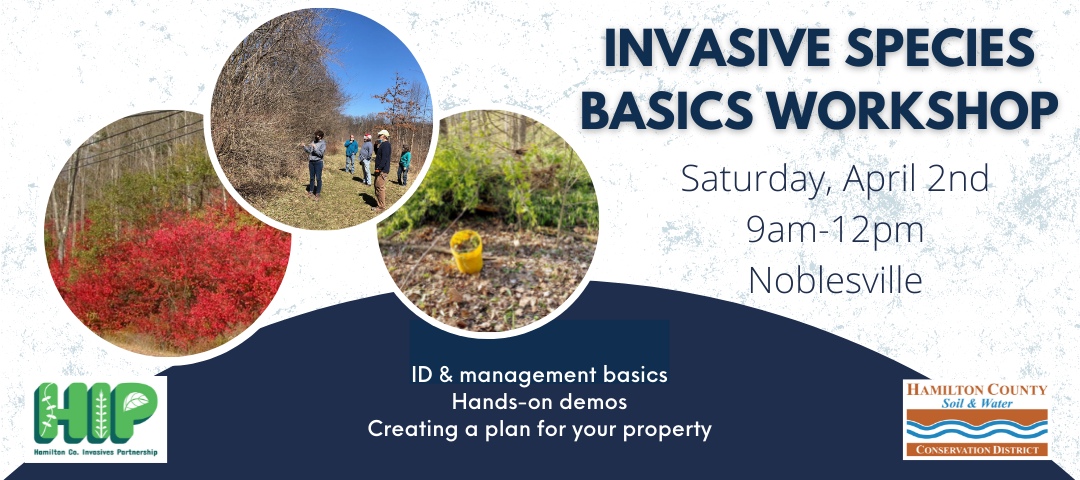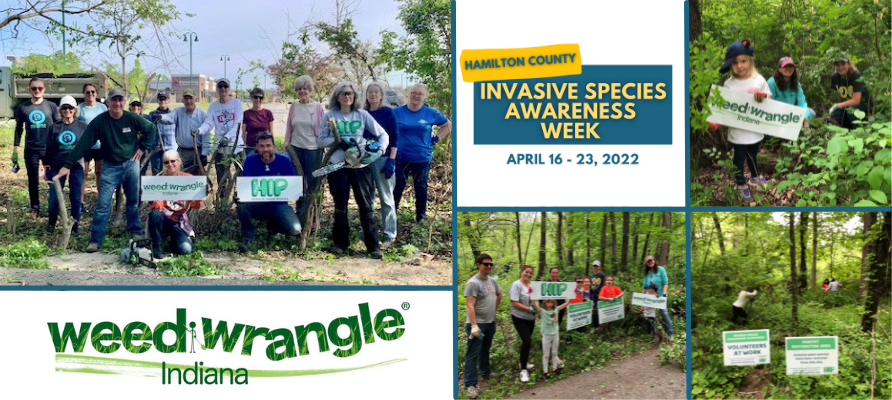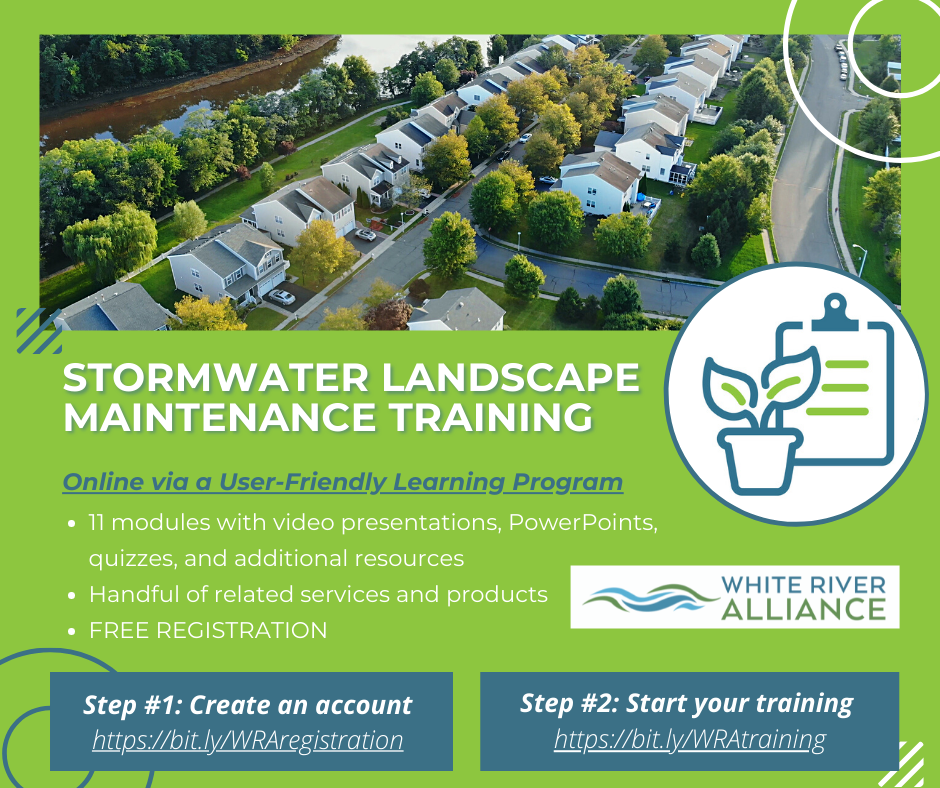| Inside this issue: - Upcoming Events
- Native Plant Kit Pre-order Deadline 3-31-2022
- Invasive Species Workshop 4-2-2022
- Hamilton Co. Invasive Species Awareness Week April 16-23
- Rain Barrel Pre-order Deadline 5-12-2022
- Hamilton SWCD Photo Contest Deadline 6-24-2022
- #InvasivesBucketChalllenge
- 2022 Conservation Photo Contest
- New Prairie & Native Booklet Available
- Welcome Our Intern - Lucy Carlstedt
- Free Seed Libraries in Hamilton County
- Agricultural Jug Recycling
- AlterNATIVES to Callery or Bradford Pear
|
|
|
| | | | |  | | |  | Join your neighbor and fight invasive species We're excited to kick off another year of Weed Wrangle volunteer invasive species workdays. HIP partners throughout the county will be hosting these volunteer events to educate and promote stewardship of properties with invasive species. Find the list of Hamilton County Weed Wrangles on our website. More events are being added each week.
Volunteers interested in additional strategic work days are invited to join the HIP Strike Team. |
| |
|
|
|
| #InvasivesBucketChallenge For Hamilton County Invasive Species Awareness Week (HC ISAW) 2022 we are offering 5 gallon buckets to aid you in your invasive species management efforts. While supplies last, free buckets with garlic mustard info are available at the Hamilton County SWCD and several county partners. Fill your bucket (or any bucket) with invasives and snap a a photo. Post on your social media with the hashtag #invasivesbucketchallenge and tag HIP (@hcinvasives) for a chance to win prizes during HC ISAW. Don't forget to challenge a few friends and neighbors to fill their bucket by tagging them in your post! |
|
|
| Hamilton County Soil & Water Conservation District News |
|
|
| | New Prairie & Native Guidebook Available The SWCD has created a new resource to guide you in establishing native plantings on your property. The new booklet, “Creating and Maintaining a Prairie: A guide for native plantings in your Indiana yard of any size” outlines planning, site preparation, planting, and maintenance for plantings ranging from small pollinator gardens to multi-acre native prairies. Free copies of the 50 page booklet are available at the SWCD office in Noblesville or you can read or download the booklet from our website. |
| |
|
| | New Online Training Available for HOA Stormwater Landscape Maintenance |
|
|
| |  | This training is great for HOA board members, landscape committees, property and HOA managers, landscapers, and more. |
| |
|
Many developments, both commercial and residential, were designed and built with stormwater infrastructure that the property owners—including HOAs and their property managers—are often now responsible for maintaining. Some of the stormwater infrastructure includes ponds, swales, check dams, shoreline plantings, rain gardens, pervious paving, and other features located on common property. The White River Alliance, in conjunction with several municipalities, have designed the Stormwater Landscape Maintenance Training to help homeowners associations, landscape contractors, and land developers understand these maintenance requirements and how to read Operation & Maintenance Plans in order to avoid corrective action. This online, on-demand training replaces the annual HOA landscape workshop. The SWCD is happy to present Module 13- Helpful local resourcse and partnerships. |
|
|
| | Welcome Noblesville Highschool Intern - Lucy Carlstedt |
| Lucy will be attending Indiana University Bloomington in the fall of 2022, for a Bachelor’s of Science in Public Affairs: Environmental Management at the O’Neill School of Public and Environmental Affairs. She is a senior at Noblesville High School, and would say her favorite class is AP Environmental Science. She aspires to have her PhD in Environmental Policy and hopes to continue her education and go into Environmental Law. |
|
|
| | Free Seed Libraries Located Across Hamilton County The first seed library in Hamilton County opened in 2017. There are now seed libraries available at Carmel Clay Public Library, and at Fishers and Noblesville branches of Hamilton East Public Libraries. Each seed library provides up to 5 packets per visit to a total of 20 packets per season to patrons. The seeds are free to Hamilton County residents and are available during regular branch hours from late March through October. As of the 2021 growing season, there is also a NEW Little Free Seed Library box at the Hamilton County Fairgrounds that will feature a combination of seeds saved and donated by Master Gardeners, and donations by various seed companies. |
|
|
|
|
| | | Recycle Jugs from Agricultural Use Acceptable containers MUST be triple rinsed, clean and dry. Only dry, residue-free rinsed containers are accepted at collection sites. Only HDPE (resin code #2) plastics are collected. All sizes up to 55-gallon drums. Containers that are labeled for crop protection, animal health, forestry, vegetative management, and specialty pest control are all acceptable. Home and garden protection products are NOT acceptable. Caps and rubber linings are not accepted and must be disposed of as normal solid waste. Labels and attached booklets must be removed. Information submitted by Hamilton County Household Hazardous Waste |
| |
|
| |
|
| AlterNATIVES to Callery or Bradford Pear Considering finally removing Callery pear trees from your property? Congrats! You’re taking a major step in the control of invasive species not only in your yard, but everywhere. These trees create small fruits with seeds that are transported by birds. By removing this species from your yard, you’re not only protecting you and your neighbor’s properties but also helping to conserve some of our beautiful parks and public lands.
Callery pear has largely been used as an attractive landscaping tree for new houses and neighborhood developments due to their fast-growing nature and attractive, shiny leaves. While they do have some positive qualities their poor structure, shallow roots, strong smelling flowers, and invasive qualities make them a nuisance in the home landscape. Although Callery pear cultivars are bred to be sterile, they can cross pollinate with other cultivars and with the original Callery pear. Each time cross pollination happens, the species DNA revert closer and closer to the original Callery pear species—thorns and all. This creates a positive feedback loop where cultivars cross pollinate, produce seeds that are scattered around by birds, the seeds grow into trees, and then those trees provide another mechanism for the cross pollination of the cultivar trees. These seeds that escape intentional landscapes can grow into fast growing and aggressive thickets. Click the link below to learn about removal techniques and native replacements for these trees. |
| |
|
| | | April showers bring..... drainage issues! We've assembled information on drainage concerns and some of our favorite drainage resources on a new page of our website. Check it out here. |
| | | Friend of Conservation David Brost Kate Hoffman
Maria Garavaglia Terry Luley
Kim Gauen Duane & Mary Rinker
Amber Good Joanna Scott
Megan Hart John South
Jennifer Hensley Beth Williams Craig Wind |
|
|
Compassionate Conservationist Jeanette Bogren
Andrew Fritz
Dallas Hester
Jill Lloyd |
|
|
| Shelly Brown Becks Superior Hybrids
Patricia Chester Karen Hymbaugh Phil Flanagan Debara Reese Steve Hilger Sara & Zachary Sprunger |
|
|
| |
|
| | Hamilton County SWCD
1717 Pleasant St. Suite 100 | Noblesville, Indiana 46060
3177732181 | soil.water@hamiltoncounty.in.gov |
| | |
|
| |
|
|